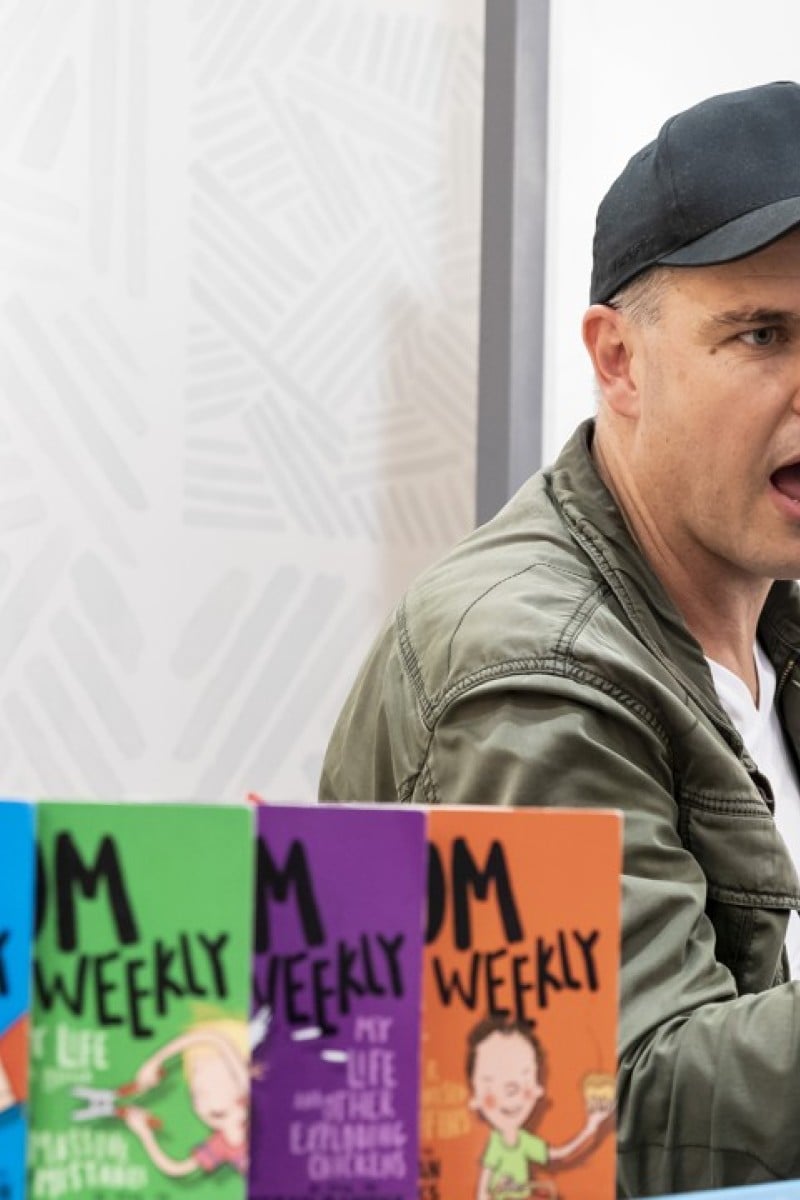
Australian YA author Tristan Bancks on how his acting and directing background helps with his creative process
The creator of the 'Tom Weekly' series got his start in the entertainment industry as an actor on TV soap opera 'Home and Away'
 Australian author Tristan Bancks attended the Hong Kong International Literary Festival and gave a creative writing workshop to local students.
Australian author Tristan Bancks attended the Hong Kong International Literary Festival and gave a creative writing workshop to local students.It’s an author’s job to paint pictures inside readers’ heads with the words in their books. But, because of his background in filmmaking, Tristan Bancks tries to make his words translate well on the big screen, too.
When the Australian author was 10 years old, Bancks wanted to join the police force – much like the main character of his award-winning novel, Two Wolves, does. Later, however, his interest in movies led him to pursue an entertainment career instead.
Bancks got his foot in the entertainment industry’s door when he was offered a role on the popular Australian TV soap opera Home and Away in the early 90s. Later, he moved off-screen and directed several short films.
It wasn’t just acting and directing that inspired Bancks, though – he was also passionate about writing. Between films, Bancks would write scripts and articles for magazines and newspapers. In 2008, he published his first book, Mac Slater Coolhunter 1: The Rules of Cool. He has published 13 books since.
Although Bancks has stopped acting and directing films to become a full-time author of children’s and YA books, he still thinks like a director.
“The key to being a good author,” he says, “is to work out how to bring life to the story in all sorts of ways.” He is now preparing to adapt several of his books for the screen and stage.
Bancks is always thinking of ways to take his stories beyond the pages of his books. This preparation has stood him in good stead: Two Wolves, for example, has already been adapted for the stage, and might in future also be turned into a TV series.
He has also launched a video game inspired by one of his books, and has developed a story-brainstorming app called Story Scrapbook. The app allows users to bring together images, video, music, text, and web grabs to create a story idea in a fun and interactive way.
“It is based on my own multimedia-fuelled writing process,” he says. “When I’m writing a book, I gather together pitches, videos, music, and maps.”
Being about to visualise a story in his head is key to Bancks’ writing process. “I like to be able to see and feel what the story is like, and hear what it sounds like as well. These are all the things that I’ve learned from filmmaking.”
Many of Bancks’ books address big moral questions that many young teens grapple with. “When you get to 11, 12 years of age, you start to think for yourself and make your own choices. Before then, your parents tell you what is right and wrong.”
Although he finds it exciting to write for young people, Bancks admits that it can be a challenge to make them appealing. “I don’t try hard to be cool,” he says of his writing process. “I want it to grow out of me, feel true, entertain myself first.”
When faced with writer’s block, the author says he likes to go outside and write without pressuring himself. “I do three pages in my notebook every morning and see what happens.
“Writing a little, even if it’s just five minutes worth every day, makes you a better writer,” he adds. “You can work on your problems, too. If there’s something going wrong with your school, family, or friends, you can write about them and explore your thoughts through words.”
Another tool that helps the writer complete a book is using an old-fashioned typewriter. He says that tapping away on the keys and hearing the “bing” when he reaches the edge of a page is what keeps him motivated during the writing process.
When asked what qualities he believes makes a good writer, Bancks says they must “dare to imagine, let go of the fear of making mistakes and push through, and keep writing even when it’s not going well”.
Bancks has made a successful career out of all of his passions. He says that anyone who wants to make a living by doing what they love needs to learn to listen to themselves.
“Think about the things you love,” he says. “Learn as much as you can about them. And practise, practise, practise. The only reason I can keep doing what I love is because I wake up every morning and practise.”
Edited by Nicole Moraleda
You might also like:
Why British YA author Patrice Lawrence structures her books like popular K-dramas
